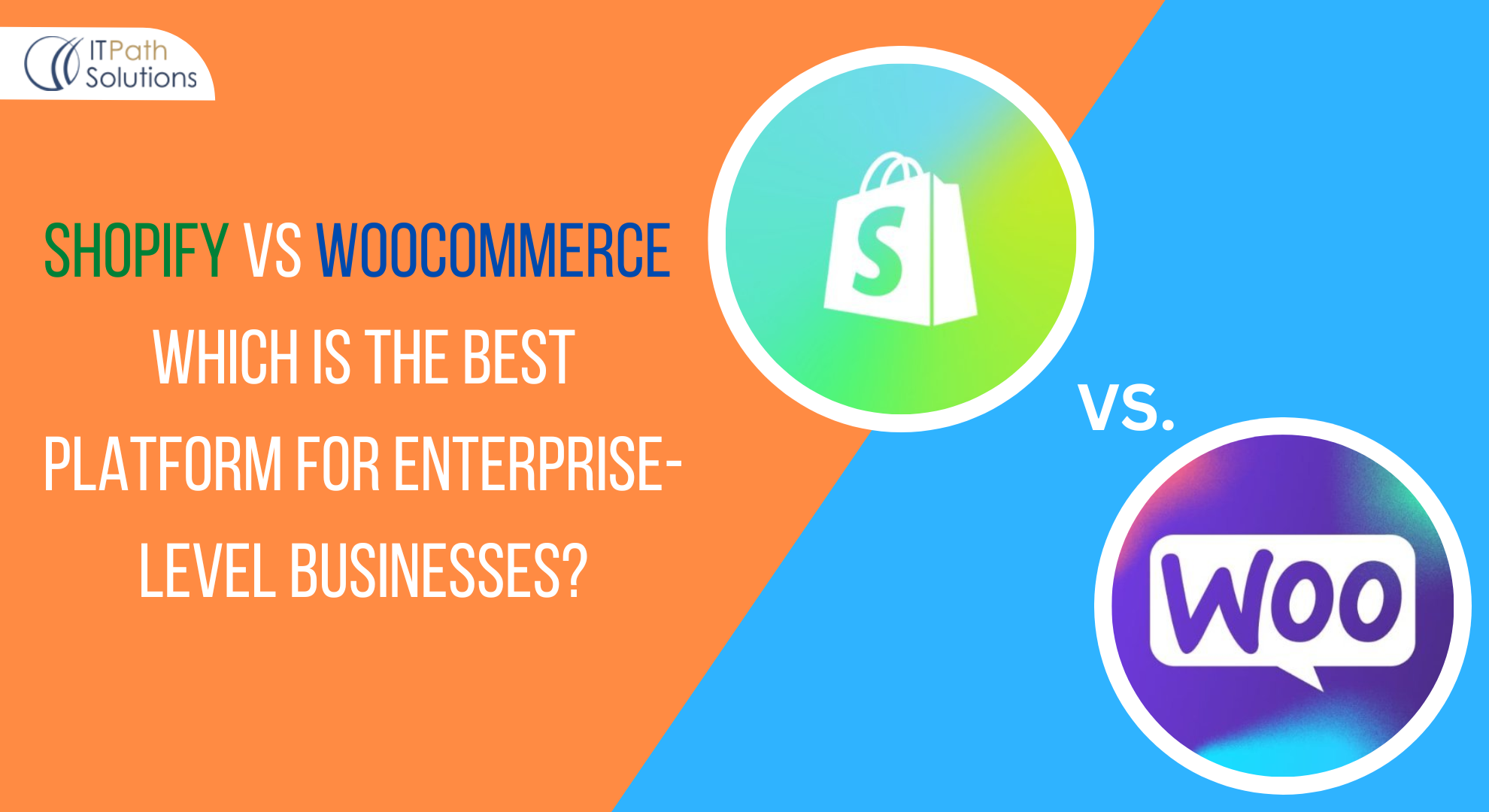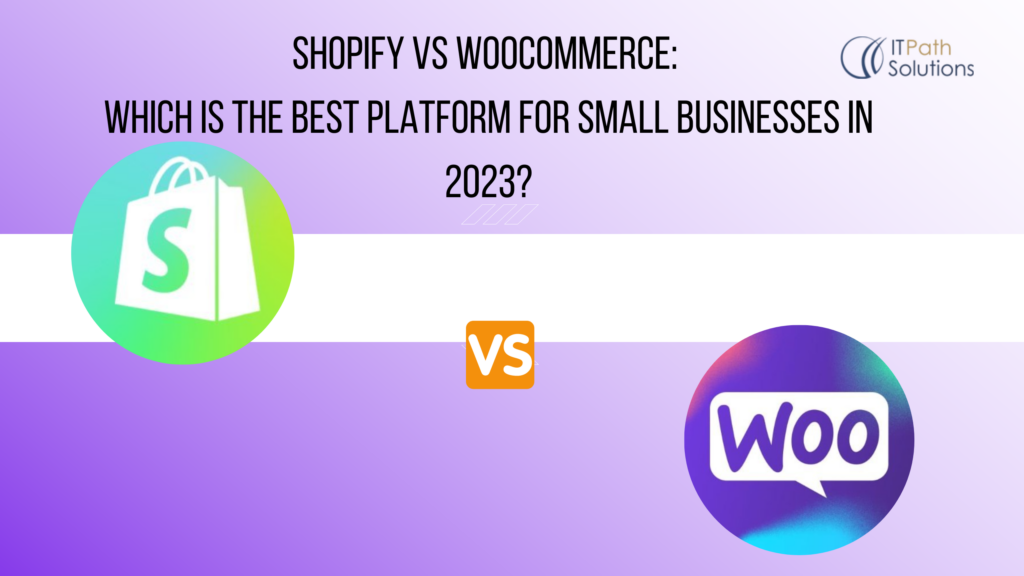Shopify vs WooCommerce: Which Is The Best Platform For Enterprise-Level Businesses?

E-commerce platforms have become an essential tool for businesses of all sizes, including enterprise-level businesses. With the rise of online shopping, it’s more important than ever for businesses to have a strong online presence. The right e-commerce platform can make the difference between success and failure when it comes to building an online business. In this blog post, we will be comparing two of the most popular e-commerce platforms: Shopify and WooCommerce. We will look at the features and benefits of each platform and compare them to help enterprise-level businesses make an informed decision about which platform is best for them for eCommerce solutions.
An Overview of Shopify
Shopify is a widely popular e-commerce platform that is known for its ease of use and scalability. It’s a fully hosted platform, meaning that Shopify takes care of the technical aspects of running an online store, such as hosting, security, and software updates. This allows businesses to focus on running their store and growing their business, without worrying about the technical aspects of running an online store.
One of the key benefits of Shopify is its ease of use. The platform has a user-friendly interface that makes it easy for businesses to set up and manage their online store. Even businesses without any technical knowledge can quickly set up a professional-looking online store. Shopify also offers a wide range of customizable templates and themes to choose from, which can help businesses create a unique online store that stands out from the competition.
Another benefit of Shopify is its scalability. As a business grows, its e-commerce needs may change, and Shopify can accommodate these changes. Shopify can handle a large number of products and handle high levels of traffic, making it suitable for enterprise-level businesses.
Shopify also offers a wide range of integrations with other apps and services, such as payment gateways, shipping providers, and marketing tools. This makes it easy for businesses to add new features to their store and automate certain tasks, such as tracking inventory, managing customer data, and analyzing sales data. You can hire expert Shopify developers to do these integrations.
In summary, Shopify is a popular e-commerce platform that is known for its ease of use, scalability and integrations. It’s a great choice for enterprise-level businesses that want to set up an online store quickly and easily, without worrying about the technical aspects of running an online store.

An Overview of WooCommerce
WooCommerce is a free, open-source e-commerce plugin for WordPress, which is a popular content management system (CMS). This platform is known for its flexibility and customization options, making it a great choice for enterprise-level businesses that want to have full control over the design and functionality of their online store.
One of the key benefits of WooCommerce is its flexibility. The platform is built on top of WordPress, which means businesses have access to a wide range of themes and plugins that can be used to customize the look and feel of their online store. Additionally, WooCommerce is an open-source platform, which means businesses can access the code and make customizations as needed. This level of flexibility is ideal for enterprise-level businesses that have specific requirements for their online store.
Another benefit of WooCommerce is its integration with WordPress. WordPress is a popular CMS that is used by businesses of all sizes, and WooCommerce is built to work seamlessly with it. This integration allows businesses to easily manage their website’s content and their online store from one platform. This can save time and resources, making it more efficient for enterprise-level businesses.
WooCommerce also offers a wide range of features, including support for multiple languages and currencies, multiple payment gateways, and integrations with popular shipping providers. These features make it easy for businesses to sell products globally, and expand their reach.
In summary, WooCommerce is a flexible and customizable e-commerce platform that is built on top of WordPress. It’s a great choice for enterprise-level businesses that want full control over the design and functionality of their online store, and want to take advantage of the integration with the widely popular content management system.
A Comparison of WooCommerce & Shopify
When comparing Shopify and WooCommerce, it’s important to consider the similarities and differences in terms of features, pricing, and scalability.
In terms of features, both Shopify and WooCommerce offer a wide range of features that can help businesses set up and manage their online store. Both platforms support multiple languages and currencies, have integrations with popular payment gateways and shipping providers, and provide tools for managing inventory, customer data, and sales data. However, WooCommerce offers more flexibility in terms of customization, as it is open-source and built on top of WordPress, which offers a wide range of themes and plugins. Shopify, on the other hand, is a fully hosted platform that offers a wide range of customizable templates and themes, but has less flexibility in terms of customizing the code.
In terms of pricing, Shopify offers a subscription-based pricing model that starts at $29 per month and goes up to $299 per month for the advanced plan. This pricing includes hosting, security, and software updates. WooCommerce, on the other hand, is a free, open-source platform, but businesses will need to pay for their own hosting, security, and software updates. Additionally, businesses will need to purchase any themes or plugins they need to customize their store, which can add up to the overall cost.
In terms of scalability, both Shopify and WooCommerce can handle a large number of products and handle high levels of traffic. However, Shopify is a fully hosted platform, which means it takes care of the technical aspects of running an online store, such as hosting, security, and software updates. This can make it easier for businesses to scale their online store as they grow. With WooCommerce, businesses will need to handle these technical aspects on their own, which can make it more challenging to scale the store.
In summary, Shopify and WooCommerce are both popular e-commerce platforms that offer a wide range of features to help businesses set up and manage their online store. Shopify is a fully hosted platform that is known for its ease of use and scalability, while WooCommerce is a free, open-source platform that offers more flexibility in terms of customization. Both platforms have their own advantages and disadvantages, and it’s important for enterprise-level businesses to consider their specific needs when choosing between the two.
Some Real World Examples
There are many businesses of all sizes that have successfully used either Shopify or WooCommerce to build their online presence. Here are a few examples:
Shopify:
- Gymshark, a fitness apparel company, used Shopify to create a seamless shopping experience for their customers. With Shopify, Gymshark was able to handle high levels of traffic and sales, which helped them grow their business.
- Allbirds, a shoe company, used Shopify to create a beautiful and easy-to-use online store that helped them stand out in a crowded market. Shopify’s customizable templates and themes were instrumental in creating a unique online store that reflects the company’s brand.
WooCommerce:
- The New York Times, a news organization, used WooCommerce in combination with WordPress to create an online store that sells products such as books and subscriptions. The flexibility and customization options of WooCommerce allowed the company to create an online store that fits seamlessly with their website and brand.

- Nestle Nespresso, a coffee company, used WooCommerce to create a personalized and interactive online store for their customers. With WooCommerce, Nespresso was able to create a custom-designed online store that offers a personalized shopping experience for each customer.
Conclusion
These examples show that both Shopify and WooCommerce can be used to create a successful online presence for businesses of all sizes. Shopify’s ease of use and scalability make it a great choice for businesses that want to set up an online store quickly and easily, while WooCommerce’s flexibility and customization options make it a great choice for businesses that want full control over the design and functionality of their online store.
 Healthcare
Healthcare  Education
Education  Real Estate
Real Estate  Logistic
Logistic  Themes
Themes
 Plugins
Plugins
 Patterns
Patterns



